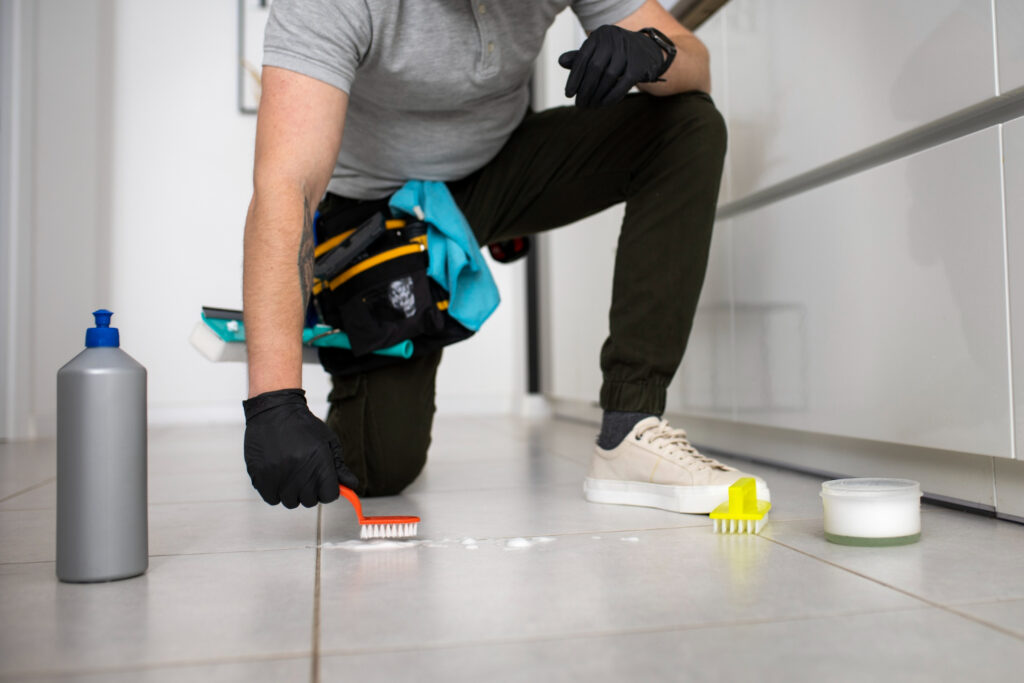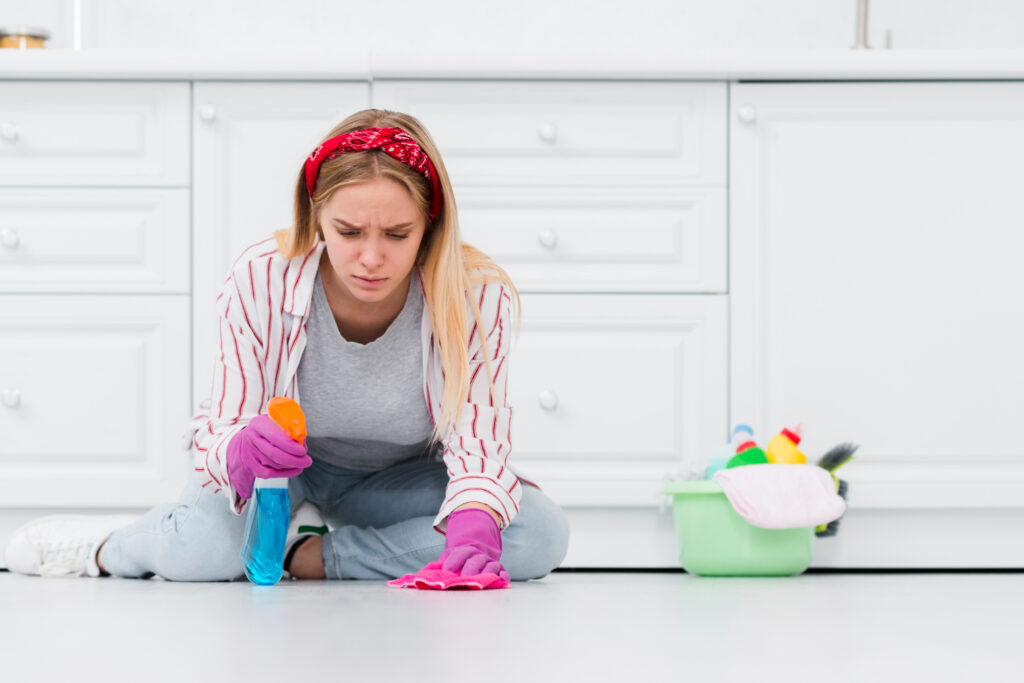Grout cleaners for floors are specialized cleaning solutions designed to effectively remove dirt, stains, grime, and mildew from the grout lines between tiles. These cleaners penetrate grout, breaking down residues and leaving it clean and refreshed. They come in various forms, such as sprays, liquids, gels, or powders, and are typically applied, scrubbed, and rinsed off according to the product’s instructions. Grout cleaners for floors help maintain the appearance and hygiene of tiled surfaces, restoring them to their original shine and cleanliness.
Best Grout Cleaner for Floors
Cleaning grout between tiles can be a challenging task, but with the right cleaner, you can easily remove dirt, grime, mold, and mildew, restoring your grout to its original color. Here, we explore some of the best grout cleaners for floors based on expert reviews and user experiences.
Zep Grout Cleaner
Zep Grout Cleaner has become well-known for its powerful composition that cleans and shines grout without the need for bleach, making it suitable for professional use. Its active components, hydrochloric acid and urea hydrochloride, loosen dirt and filth in the grout, producing amazing results with little effort.
DIY Grout Cleaner
For individuals who would rather do things themselves, a grout-cleaner mixture of baking soda, hydrogen peroxide, and dish soap has been proven to work well. Together, these components clean, brighten, and whiten grout, providing a low-cost, all-natural cleaning solution.
LTP Grout Stain Remover
For grout cleaning, LTP Grout Stain Remover is an additional great choice. Positive feedback has been given to this product for its capacity to revive grout and remove stubborn stains, leaving tiles looking clean and new. It works very well to keep bright tiles shining.
Professional Cleaning Services
Hiring a cleaning service like MCS Cleaning can yield great benefits for people who want to save time and effort. To ensure a complete and effective cleaning procedure, expert cleaners deep clean tiles and grout using cutting-edge methods and non-toxic solutions.
Pros and Cons of Using Commercial Grout Cleaners
Pros:
Efficient Cleaning: Strong cleaning ingredients included in the formulation of commercial grout cleaners enable them to efficiently eliminate grout buildup, stains, and dirt that may be challenging to eradicate with do-it-yourself remedies.
Time-saving: Grout cleaning, particularly when done by hand, maybe a labor-and time-intensive task. With commercial cleaners, you can accomplish expert-caliber outcomes in a significantly shorter amount of time.
Specialized Tools and Equipment: Commercial grout cleaning businesses are equipped with tools and equipment that can fit into narrow grout lines and offer a deeper, more complete clean.
Better Appearance: You can keep your tiles and grout appearing brand-new by using industrial grout cleaners regularly to preserve their appearance.
Health Benefits: By getting rid of germs, mold, and other allergies, commercial cleaners may make homes cleaner and healthier.
Cons:
Cost: Especially for bigger areas, professional grout cleaning services may be more expensive than do-it-yourself approaches.
Potential harm: The surfaces could sustain harm if the cleaning firm lacks the necessary training or experience to properly clean a particular type of tile or grout.
Convenience: If you have a busy schedule, it may be necessary for you to be present during the cleaning procedure.
Chemical Exposure: Harsh chemicals used in some industrial cleaning products may be dangerous for you or the environment.
Dependency: Using only cleaning services from professionals runs the risk of causing routine maintenance to be neglected, which calls for more frequent and costly cleaning sessions.
In general, the benefits of using commercial grout cleaners frequently exceed the drawbacks, particularly if you value getting expert-caliber results and preserving the long-term look and integrity of your tiled surfaces. To guarantee the greatest result, it’s crucial to consider the risks and expenses and pick a trustworthy cleaning service with plenty of experience.
Some DIY Grout Cleaner Recipes
Here are a few successful recipes for homemade grout cleaner:
Using hydrogen peroxide and baking soda
- To make a paste, combine 1/4 cup hydrogen peroxide and 1/2 cup baking soda.
- Use a brush to scrape the grout after applying the paste and letting it sit for 15 to 20 minutes.
- This mixture aids in brightening and whitening discolored grout.
Dish soap, baking soda, and hydrogen peroxide
- Mix 1/4 cup hydrogen peroxide, 1/2 cup baking soda, and 1 tsp dish soap to form a paste.
- Scrub the grout after applying the paste and letting it sit for 15 to 20 minutes.
- Dish soap works to cut through filth and grease.
Baking Soda and Bleach
- To make a thick paste, combine 3/4 cup baking soda and 1/4 cup bleach.
- After applying the paste to the grout, scrub it for 10 to 20 minutes.
- Bleach aids in cleaning and brightening the grout.
Vinegar and Dish Soap
- Fill a spray bottle with one cup each of a 1:1 vinegar and water solution and dish soap.
- Scrub the grout after applying the solution and letting it set for five to ten minutes.
- Dish soap and vinegar combine to break down filth.
To give the components time to function, it is important to let the solution remain on the grout for 10 to 20 minutes before cleaning using any of these homemade cleaners. For more efficient cleaning, using an old toothbrush or a brush with stiff bristles is advised.

Tips for Using DIY Grout Cleaner Safely
Some tips for using DIY grout cleaner safely include:
Test on a tiny area: To make sure the homemade grout cleaner doesn’t damage or discolor the surface, test it on a tiny, discrete area before applying it to the entire surface.
Protective Gear: To avoid skin irritation or unintentional eye contact, wear gloves and protective eyewear when using DIY grout cleaners.
Ventilation: To prevent breathing in cleaning solution fumes, make sure the area you are cleaning has enough ventilation.
Observe Instructions: To get the best results and prevent damage to surfaces or yourself, always adhere to the directions for the DIY grout cleaner recipe, including mixing ratios and application techniques.
Avert Combining with Harsh Chemicals: Do not combine homemade grout cleaners with other harsh chemicals, such as bleach, since this may lead to unfavorable reactions and surface damage.
Rinse Well: To get rid of any cleaner residue, properly rinse the grout cleaning area with clean water after using the homemade solution.
Handle Proper Storage: If you have any extra homemade grout cleaner, don’t save it for later usage because components like hydrogen peroxide become less efficient after being exposed to light for an extended time. Preparing a new batch every time you need it is the best option.
You may safely use do-it-yourself grout cleaning products and minimize any hazards or negative effects on your surfaces and health by adhering to these safety precautions.
For more home improvement tips, read: Weathered Oak Stain
Frequently Asked Questions (FAQs)
What’s the best cleaner for floor grout?
The best course of action is to attempt washing your grout with just water and a mild cleaner, like dish soap. If this doesn’t work, test the cleaner on a small patch of grout before deciding to apply it all over your surface. Before attempting to thoroughly clean, we advise using a specialized grout cleaner as a starting point.
What do experts use for grout cleaning?
For expert grout cleaning, steam cleaning or a machine scrubber are also excellent choices. For this kind of cleaning task, either kind of machine could be a suitable option.
What shouldn’t be used to clean grout?
The grout’s color could be faded by bleach. The grout appears worn out and outdated because to its irregular appearance. Apart from bleach, you should stay away from ammonia-based cleaning products. Cleaners with an ammonia basis have the same potential to harm as bleach.
Which homemade grout cleaner for tiles works the best?
A popular and efficient DIY grout cleaner recipe calls for a blend of dish soap, baking soda, and hydrogen peroxide. The best natural bleaching treatment is a combination of cream, tartar, and lemon juice. Strongly acidic substances, like vinegar, should be avoided as they might erode grout.
Bottom Line
Tiled floors require regular grout cleaning and upkeep to maintain their overall aesthetic and hygienic standards. Choosing a grout cleaning procedure that best fits your needs and preferences is important, whether you decide to use homemade solutions using hydrogen peroxide and baking soda or commercial grout cleaners like Zep Grout Cleaner. While DIY solutions offer a more affordable and natural alternative, commercial cleaners offer convenience and professional results. Choosing the correct cleaner, whether commercial or do-it-yourself, can help keep your floors looking spotless and new because regular grout care is crucial.

